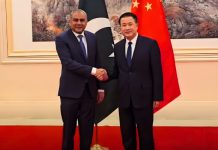By Uzma Zafar
Islamabad: A five-member larger bench of the Supreme Court of Pakistan while hearing the presidential reference on Senate open balloting on Friday, said that representation of every political party in the elections must be proportional to its votes.
The bench, headed by Chief Justice of Pakistan (CJP) Gulzar Ahmed, conducted the hearing and remarked that members of a political party in any provincial assembly can vote for the candidates of their allied parties.
The CJP inquired about the Election Commission of Pakistan’s (ECP) answer, to which its lawyer replied that the answer has been submitted which is similar to the first one. Justice Gulzar Ahmed said the apex court will examine the details.
Pakistan People’s Party (PPP) counsel Raza Rabbani said the purpose to constitute the Senate was to provide equal representation to all provinces, and consensus between both houses in the parliamentarian system is not possible. He stated that the purpose of the Senate was to give equal representation to all political matters, adding that the two houses of the parliament do not run in agreement in a parliamentary system.
“It isn’t necessary for a party forming its government in the federation may also have a majority in the province too,” he explained, further stating that the opposition can change the proportion of seats in the Senate.
Rabbani said he would submit a detailed response on proportionate representation, to which Justice Ahsan remarked that the term ‘proportionate representation’ is mentioned in both Articles 51 and 59 of the Constitution. A political alliance also cannot affect proportionate representation, he said occasion, adding that parties may form alliances freely.
In reply, the PPP leader said that the court’s definition of proportionate representation would only apply in ideal circumstances and did not reflect the reality of political affairs.
He pointed out that Pakistan Tehreek-e-Insaf (PTI) and Pakistan Muslim League-Q (PML-Q) have their alliance in Punjab, while the PTI has given the PML-Q a seat in the Senate.
Justice Umar Ata Bandial, at this point, inquired why it was necessary to keep it a secret even in the case of an inter-provincial alliance. Rabbani responded by saying: “there’s a difference between ‘horse-trading’ and a political alliance.”
The hearing was adjourned till Monday. The issue of proportionate representation has been the lynchpin pin of discourse within the apex court throughout this week. Previously, during the hearing, Justice Ahsan had inquired how ECP would maintain proportional representation and if the votes could ever truly be secret.
Referring to electronic voting, he had pointed out that anything on the Internet could be traced. Regarding proportionate representation, he had said that the ECP itself would be responsible if the party “does not get [a number of seats] in relation to its seats in the provincial assemblies”.
The ECP in a response submitted to the SC on Wednesday had maintained that the Senate elections should always be held through a secret ballot. The ECP’s counsel, citing Article 226 of the Constitution, had said that votes for the Senate elections would “always remain secret” and the votes that were cast could “not be shown to anyone”. The chief justice, on the occasion, had asked what steps the ECP would take to rectify a lack of proportional representation if it comes to pass, and if the election results should then be declared illegal.
“Vote-selling will result in tatters of proportional representation,” Justice Ahsan had remarked. “If any party gets seats [not in accordance] with its representation, the system will be destroyed,” he had added.




